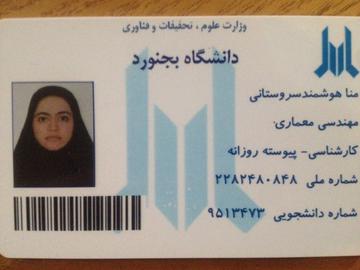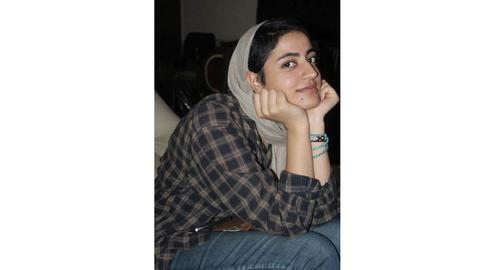Authorities in Iran continue to expel Baha’i students from universities, upholding the September 2016 decision to classify the student files of 129 Baha’is as “deficient” or “incomplete.”
Mona Houshmand, a 2016 freshman Baha’i student, was expelled and prevented from attending the Bojnord School of Architecture because of her religious beliefs on October 19, 2016. She spoke to IranWire about what happened: “On October 7, I enrolled at the University of Bojnord. After receiving my student ID card for being an architectural engineering student, I began my studies and attended all my classes.”
On September 28, the university office contacted her, asking her to complete some information on the Arts and Humanities website. “I went to the security office," Houshmand said. "There were two people present, who at first asked me personal information and then asked about my religion. I told them my religious beliefs are a private matter and that the law prohibits religious interrogation. They said they were with the Ministry of Information, and that they were allowed to interfere in the private matters of individuals. Then they said they knew we were Baha’is and that we are not allowed to study at university. I said my educational process had nothing to do with my religion, and that as an Iranian, based on the law, I have a right to higher education. But they said, ‘Based on the university entry exam’s regulations, you as an individual Baha’i do not have a right to take the entry exam to begin with.’ Then, they showed me part of the registration form for the entry exam in which it was written that participants in the university entrance exam must be Muslim or one of the nation’s official religious minorities: Christian, Jewish, and Zoroastrian.”
According to Houshmand, she was asked to sign a specific form in order for her to continue with her studies. “On the upper part of this form it was written: ‘I ... no longer belong to the Baha’i community and do not have contact with any Baha’is.’ They said if I signed this I could continue my studies. On the lower half of the same form, after my name and my last name, it was written that I am a Baha’i and follow the commands of the Universal House of Justice.”
If a student signs the lower half of the form, he or she is automatically prohibited from higher education. “I tried to convince them that education had nothing to do with my religion but they did not accept it, and insisted that I sign one of the two sections of the form. I signed the lower section of the form; they said I had two to three days to change my mind, and if I decided to continue with my studies I could go to them and sign the upper section of the form. I did not accept this and left the office.”
Houshmand also said that university personnel had been trying to confiscate her student ID using various tactics, but they were unsuccessful. “They wanted no evidence of my ever having been a student at Bojnord University to exist.”
After this incident, Mona Houshmand’s father followed up with the university. “When I learned of this incident, I immediately traveled from Shiraz to Bojnord,” he said. “The vice president of the university did not know about this issue and contacted the president of the university. He then told me that my daughter’s expulsion was because she is a Baha’i, and the National Organization for Educational Testing instructed the university to expel her. He said the university is subject to the instructions of this organization. Previously this organization gave permission for her to enrol, but now it instructs that she be expelled.”
University officials have said that the expulsion letter is confidential and they cannot release it to the public. In the case of Nazanin Nikouseresht, another Baha’i expelled in December 2016, authorities at Shiraz University claimed they could not give Nikouseresht a copy of the letter because it listed the names of five other students banned from the university.
“To file a complaint and look into this issue, I went to the supreme leader’s office at the University of Bojnord,” said Houshmand’s father. He said the person at the office he spoke with “expressed regret and was uninformed about the situation,” but also said there was nothing he could do about it. “Then he wrote a letter with the seal of the supreme leader on it and gave it to me. I gave the letter to the vice president of the university, which he probably just filed away.”
A few weeks later, he contacted the supreme leader’s office at Bojnord University to follow up on the letter. “The person responsible for the office picked up the phone and asked: ‘Who gave you permission to enter the university to begin with? You Baha’is follow a misguided religion that was fabricated by the British, and its purpose is to strike at Islam. It is obvious that your children should not go to university along with other youth.’”
visit the accountability section
In this section of Iran Wire, you can contact the officials and launch your campaign for various problems


























comments